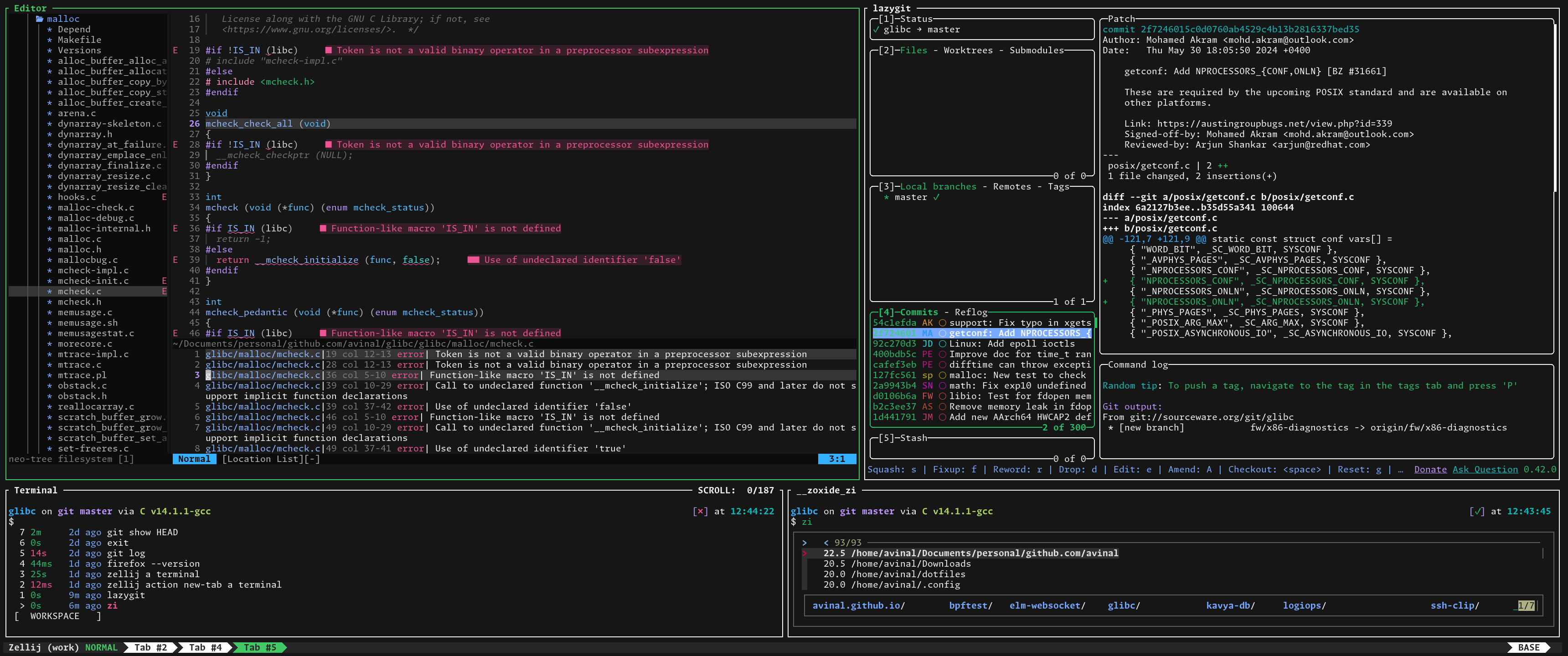
Echoes from the Shell: The Tools That Talk Back
In January, I started switching to terminal-based tools and just recently, I was able to use my terminal for most of my development work. This blog highlights what tools I am using and for what purposes.
I started programming on a Windows machine about 6 years ago. I had just joined college and had little clue about what tools to use and where to start. Slowly I learnt new things and knowing more tools from friends, seniors, blogs and YouTube. One thing was pretty common, almost everyone was recommending a Linux based OS. I wasn’t completely ready to switch, so I started using WSL2. WSL2 with Visual Studio Code were my daily driver for everything programming for next 2.5 years.
Linux loading#
I got selected into Google Summer of Code in 2021 and the project I was contributing to runs solely on Linux. So I finally left Windows and started using Ubuntu. I was also a part of GLUG (GNU/Linux Users Group) in my college, and that was one of the factors that motivated me to move. I used Ubuntu and VS Code for next 1 year.
The next significant change to my setup came in 2022 January when I joined Red Hat as an Intern. And the first task given to me was “Remove everything on your ThinkPad and install Fedora”. I used it for few months and then I switched to Fedora on my personal laptop as well. After using Fedora for 2.5 years now, I want to say Fedora is simply an excellent choice for students and developers alike (until you intend to use Arch and burn the world).
My current setup#

Note: Open the image in a new tab for better viewing.
Currently, I am using Fedora 40 with Sway Window Manager and tons of terminal based tools. Just to be clear, I am not a keyboard nerd, but it does get my work done faster and non-intrusively. I use a mouse for a fair share of my work (I own Logitech MX Master 3s). I will now be explaining what tools I use and why I prefer them. You can get additional information about them by simply an internet search as they are pretty famous.
This is not a blog about replicating the exact setup. So I will omit the obvious tools, i.e. ZSH, plugins etc. Rather, I will enlist the major tools. I am going to divide my tools in few categories:
- Tools I use for development
- Enhancing Terminal capabilities
- Miscellaneous
Tools I use for development#
This will be a trivial section, there are thousands of articles and videos on the internet that cover this topic. I am just going to add my two paise.
Neovim#
Well, I know. You are going to say “yeah, expected”. But IIWII. I started using Neovim as my primary development tool in January this year. It was a little hard to get used to it, but once I got familiar it feels like a breeze. I switched from VS Code because of how bloated it is getting. I do not want a superfast editor with outstanding benchmarks and awesome features and customizability. Those are secondary, but most of all, I don’t like being distracted. With all the new things getting into VS Code it felt like, just too many features than I need. I totally love VS Code, it was my daily drive for 5 years but I felt I needed something minimal, and minimal it is.
I did some hopping from one config to another in the last 5 months and finally, I decided to configure it myself using kickstart repository and it works better than ever. I am still learning how to get most out of it.
Lazygit#
When I moved from VS Code to Neovim, the one thing I missed most was a GUI git extension. Although I use git CLI for most of my VCS work, but having a visual display is helpful, especially for browsing changes and going through commit history. VS Code git extension is a great tool and lazygit almost replaces that for me. It has exactly those features that I generally use. Plus it is configurable, the default configuration is more than enough for most including me.
GitHub CLI#
Many people have mixed opinion about this tool. For me, it works best for what I generally do. And no, it doesn’t replace git for me, I treat it like a snippet tool that does few things with minimal effort, which would otherwise take multiple commands using git. Additionally, most of the development work I do go to GitHub, so it helps with that as well.
I mostly use it to clone, gist, creating pull requests, navigating issues, checking out pull request branches, creating new repositories, and sometimes for getting workflow status/logs. I strongly recommend it if you are eager to do more from your terminal.
Enhancing Terminal capabilities#
This category is focused on supercharging the default terminal with advanced capabilities like better prompt, multiplexing, configurable layouts, session management etc.
Alacritty#
What is wrong with Gnome terminal? Nothing. It is fantastic and I still use it for many tasks. When it comes to configuring your terminal and actually being able to reuse your configuration across machines, alacritty simply stands out. It has tons of configurations and I loved using it, so I switched to it.
Zellij#
This one is interesting and new. I started using tmux as most people do when they want to increase the density of work in a single terminal. It works and is configurable as well. But there are some shortcomings for tmux. It does not let you save a layout and the session management is basic. If you restart, you will probably lose your setup.
Zellij address these problems and includes many new features on top of it. You can create a layout in advance and also define what commands should be run on start. There is a native plugin system and you can write plugins in most languages that compile to WebAssembly. The configuration is human-friendly and you can have multiple configuration files.
Initially, most users face issues with zellij default key bindings because of their conflicts with Neovim. I choose to use different leader keys for different tools. Here is the setup I use after getting recommendation on Reddit.
- Neovim: Ctrl
- Sway WM: OS Key/Command/Win Key
- Zellij: Alt
I also heavily modified the default key bindings as I saw fit. The tool is in active development with numerous features planned.
Atuin#
I have covered Atuin before in my last post. So this will be a brief mention here. Atuin helps you sync your command history across machines and provides excellent filtering and retrieval. If you need a backup of your command history, Atuin is a way to go.
Miscellaneous#
This section focuses on the tools that aren’t very common but they rather are unique in their own way, and you can get extra superpowers.
Toolbx#
This is more like a virtual terminal environment where you can install tools and packages without adding them to the host OS. For example, if you are testing some software, or want to build a project but don’t want to install in your machine. Or even having multiple independent environment and multiple distros to develop your projects. I find this tool very useful. If you have such use cases, give it a try.
Fzf#
fzf is a companion tool that provides you fuzzy finding capabilities for a lot of common CLI tools. You can use it in a plethora of ways and the integration with tools are countless. It also comes with an interactive interface. This is a tool which I want to say, you will understand only when you use it.
zoxide#
zoxide brands itself as a smarter cd command, and this is precisely what it does. It remembers where you often go and helps you get there faster next time. It uses an impressive algorithm internally to rank the suggestions based on your use.
Echos#
Here is the list of all other tools and plugins I didn’t discuss, but they are a useful part of my daily work.
Please leave a comment, if you like reading this blog, or it helped you find a good tool.